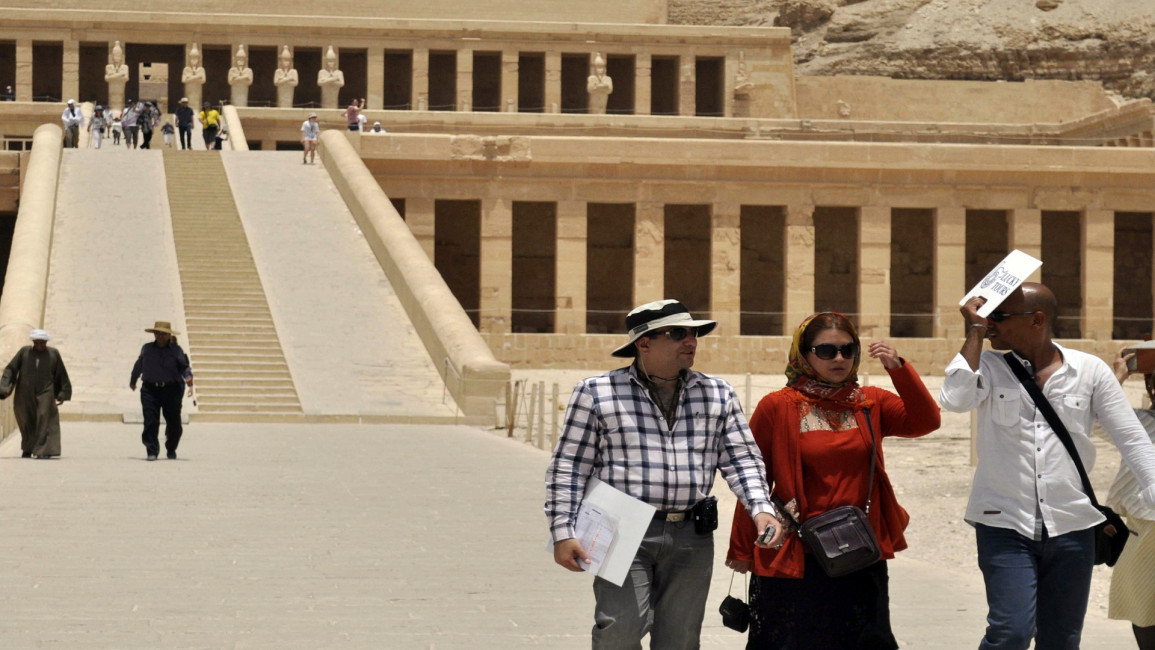Despite political rivalry, Egypt seeking to lure Iranian tourists
Despite political rivalry, Egypt seeking to lure Iranian tourists
Desperate to revive its declining tourism and replenish its dwindling coffers, Egypt seems willing to cast political rivalry aside to attract tourists from Iraq and Iran, and their cash.
3 min read
Hardline Sunni Islamists had protested visits by Iranian tourists to Egypt in 2013 [AFP/GETTY]
A senior official in the Egyptian Ministry of Tourism has said his country is taking measures to lure Iranian tourists in the last three months of 2015.
Two years ago, similar plans by the ministry under ousted President Mohamed Mursi were strongly opposed by politicians and Salafist figures hostile to Iran, some of whom even claimed that Iran could take advantage of the rapprochement with Egypt to promote Shiism.
The official told al-Araby al-Jadeed that Egypt has set a target of 50,000 Iranian tourists by the end of the year, and 200,000 by the end of 2016.
The tourism official, who asked not to be named, said: "We have sent instructions to tourist operators through the Egyptian Federation of Chambers of Tourism approving organized tours for Iranians and Iraqis."
He added that the agreements previously signed in early 2013 following a visit by former Tourism Minister Hisham Zazou to Tehran would be reactivated.
The ministry official said that the expected revenues in the event Egypt attracts 200,000 Iranian tourists next year would be upward of $250 million. He pointed out that this would also increase occupancy rates in the southern regions, which have seen a dramatic decline in tourism over the past four years.
The official said Iranian tourists are expected to be big spenders, given the kind of destinations they are known to visit including Turkey, the UAE and Malaysia.
He added: "We are in talks with nationa carrier Egypt Air to launch routes from Luxor and Aswan to Tehran."
In turn, Ilhami al-Zayat, CEO of a number of tourist companies and former chairperson of the Egyptian Tourism Federation, told al-Araby al-Jadeed that Iranian tourism in Egypt should not be politicized, stressing that Iranian tourists are like any tourists from other nationalities.
Recently, Iran waived visa requirements for nationals of Egypt, Lebanon and Syria.
Diplomatic relations between Egypt and Iran were severed 35 years ago, due to Tehran's strong opposition to the peace treaty signed between Egypt and Israel.
In March 2013, flights resumed between Tehran and Cairo for the first time since the Islamic Revolution in Iran in 1979
In July, Iran and the major powers signed an agreement ending a 12-year-old standoff over Tehran's nuclear programme.
The deal will allow the gradual lifting of international sanctions on Iran, slowly reintegrating the Islamic Republic into the world economy.
This has whet the appetites of governments and businesses around the world, who have been eager to tap into the lucrative Iranian market.
This article is an edited translation from our Arabic edition.
Two years ago, similar plans by the ministry under ousted President Mohamed Mursi were strongly opposed by politicians and Salafist figures hostile to Iran, some of whom even claimed that Iran could take advantage of the rapprochement with Egypt to promote Shiism.
The official told al-Araby al-Jadeed that Egypt has set a target of 50,000 Iranian tourists by the end of the year, and 200,000 by the end of 2016.
The tourism official, who asked not to be named, said: "We have sent instructions to tourist operators through the Egyptian Federation of Chambers of Tourism approving organized tours for Iranians and Iraqis."
| 200,000 Iranian tourists would bring in more than $250 million in revenues for Egypt |
He added that the agreements previously signed in early 2013 following a visit by former Tourism Minister Hisham Zazou to Tehran would be reactivated.
The ministry official said that the expected revenues in the event Egypt attracts 200,000 Iranian tourists next year would be upward of $250 million. He pointed out that this would also increase occupancy rates in the southern regions, which have seen a dramatic decline in tourism over the past four years.
The official said Iranian tourists are expected to be big spenders, given the kind of destinations they are known to visit including Turkey, the UAE and Malaysia.
He added: "We are in talks with nationa carrier Egypt Air to launch routes from Luxor and Aswan to Tehran."
In turn, Ilhami al-Zayat, CEO of a number of tourist companies and former chairperson of the Egyptian Tourism Federation, told al-Araby al-Jadeed that Iranian tourism in Egypt should not be politicized, stressing that Iranian tourists are like any tourists from other nationalities.
Recently, Iran waived visa requirements for nationals of Egypt, Lebanon and Syria.
Diplomatic relations between Egypt and Iran were severed 35 years ago, due to Tehran's strong opposition to the peace treaty signed between Egypt and Israel.
In March 2013, flights resumed between Tehran and Cairo for the first time since the Islamic Revolution in Iran in 1979
In July, Iran and the major powers signed an agreement ending a 12-year-old standoff over Tehran's nuclear programme.
The deal will allow the gradual lifting of international sanctions on Iran, slowly reintegrating the Islamic Republic into the world economy.
This has whet the appetites of governments and businesses around the world, who have been eager to tap into the lucrative Iranian market.
This article is an edited translation from our Arabic edition.



